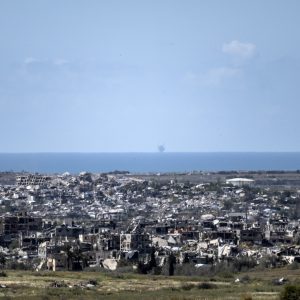Syrians in Kabun struggle to rebuild lives
DAMASCUS (AA) – In the Kabun neighborhood of Damascus, Syrians are struggling to rebuild their lives.
The most visible scars of the 13-year civil war are found in Kabun, where Syrians fought for freedom against the Bashar al-Assad regime.
Located 6 kilometers (3.7 miles) from central Damascus, Kabun was once home to a thriving Tailors Bazaar with a population of nearly 100,000.
Today, much of Kabun is reduced to rubble. Some debris has even become mass graves, said residents.
In the nearby Tishreen neighborhood, returnees are living without services like electricity or water, surrounded by buildings scarred by shrapnel, bullets and fires.
The remnants of bombs used by Assad and his allies are found on the roofs of the few houses left standing. Amid the destruction, children playing symbolize hope for a better future.
– Al-Merri family holds on in last standing house –
The al-Merri family — father, son and grandson — is holding on in the last remaining house in Kabun.
Samir al-Merri, 58, has lived in Kabun since the 1980s. Before the war, the neighborhood was home to people from across Syria, Iraq and Yemen.
“The Tailors Bazaar used to be busy. Now, nothing is left. It’s completely destroyed,” Samir noted.
He shared the pain of losing his son in 2012, who was detained by the regime. “I stayed here under bombardment until 2015, hoping to find him. I saw nearly 300 bodies in the streets, executed with shots to the head,” he said. “In the end, I lost hope. We had four houses, but now only one remains.”
Samir received confirmation that his son, Faris, died in 2016 in the Sednaya Prison, known as the “human slaughterhouse.”
– ‘I felt like a criminal in my own country’ –
Samir’s son, Ahmed, 40, fled the bombings in 2016 and returned to Kabun in 2021. Before the revolution, they avoided politics, but after the uprising, Ahmed realized the oppression they had been living under.
“We were living on a farm. The regime’s men controlled everything — our house, car, property — they all belonged to them,” said Ahmed.
Ahmed, who avoided military service, explained that after returning to Syria, the military tried to force him into the army.
“I’m 40 now, what could I do in the army? I have five children. Who would take care of them? Who would I fight against? Syrians like me,” he said.
“I always felt like a criminal in my own country. I was constantly running, paying bribes at every checkpoint. They threatened to send me to Sednaya. My house was looted. I’m happy the regime has fallen,” he added. “I’m happy for my children. Now I can travel freely without checkpoints or questions.”
– ‘Regime stole my childhood’ –
Mohammed, 22, the youngest member of the al-Merri family, said his childhood was marked by “bombardments, bombs, and explosions.”
“The regime stole my childhood, my youth, my life. I have nothing left. At 22, I’m starting my life from scratch,” he said. “I was a deserter, hiding at home. They tried to force me into the army for no reason.”












